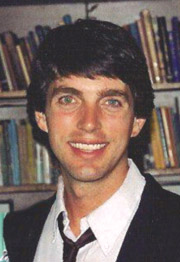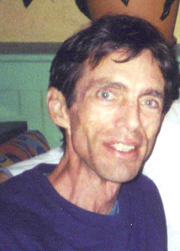Sex, Lies, and Pills
Setting the record straight on living with AIDS. Local men plan a documentary, and tell their own stories.
by Brandon Wolf
See also
The Miracle Man: David Rogers’ Story
The Air Force, AIDS, & AVES: Jereme Scott’s Story
“Yes, it’s easy to take HIV medications. You just pop a few pills,” says Jereme Scott, a 25-year survivor of AIDS. “But these medications come with huge side effects. It’s not a manageable disease—it’s a disease to be managed.
“Pick up any gay magazine and look at the drug ads,” says Scott. “What kind of people do you see? You see real pretty people surfing, riding bikes, doing all the wonderful things that young people do. But that’s a lie. Sure it’s a white lie, but it’s done on purpose.”
Scott is a member of the HIV social group at Bering United Methodist Church. “I have been going there for several years,” he says. “I see a lot of young people, 18 to 24, coming in. I get really angry and want to give them a slap up alongside the head, and then give them a hug. These kids are coming into HIV with no knowledge of what it was like in the 1980s, when we saw most of our friends die. So now we are seeing a third generation of people diagnosed with HIV.
“It was out of anger that I decided to do something as a long-term survivor, to create a new and dynamic type of education/prevention tool, a tool which will benefit the young people coming up. I’m 56 years old and on the down stroke. But these kids are on the up stroke, and they need to be making better choices. About two years ago, I began to think about making a documentary which shows the reality of living with AIDS.”
Recently Scott talked with OutSmart about his dream, joined by his friend David Rogers, another 25-year survivor of AIDS. Together they shared thoughts about producing a documentary which will be titled Sex, Lies and Pills.
Why This Film Needs to be Made
“I want kids to see what can result if they don’t wear condoms,” says Rogers. To transform their dream into a reality, Scott and Rogers have conducted three focus group meetings with interested individuals. “We invited people we knew who have been infected or affected by HIV,” Scott explains.
Sex, Lies and Pills is also the title the focus group selected. “We all know what sex is,” says Scott. “We know what lies are, too. In the context of AIDS, there are lies that go in two directions. It can be a drug company that tells white lies by making an AIDS diagnosis appear to be much less serious than it really is. Or it can be a partner who lies to their partner about their HIV status. And it all leads to pills.
“We’re not anti-medication,” Scott emphasizes. “Drugs have saved our lives, so we can’t be anti-medication. But we want to tell the truth about what day-to-day life with pills is really like.”
“An AIDS diagnosis is going to break and shatter a kid’s dreams. It will steal his beauty,” says Rogers. “I care about kids because they can be easily influenced. It’s important to talk to them in a manner that they will quickly understand. Physical attractiveness is one of the things that gay men use to pull other people into their lives. AIDS drugs can waste your body, destroy muscle tone, and leave your face sunken and gaunt.”
Rogers knows of these effects from first-hand experience. “I once weighed 60 pounds less than I do now, and I’m quite lean as it is. There was a period of time when I looked like an African famine victim. I want kids to see before and after pictures of me.
“AIDS drugs affect one’s ability to focus and concentrate,” Rogers points out. “It affects how you’re able to conjugate verbs and articulate your thoughts. It changes the whole way you live. And there is pain one has to live with. I once had to undergo radiation for tumors in my throat. My mouth looked like red cottage cheese. Every breath I took felt like a stab. I was unable to eat or swallow any food.”
Rogers says that although he nearly died several times, he has been spared. “But it’s opened up other autoimmune problems. I have really severe osteo-porosis and advanced rheumatoid arthritis. I have a neurological disease that’s located in my nerve bundles. These conditions will never go away. I can only utilize therapies to make them more manageable. But sometimes I wake up in the morning and literally can’t walk because of the arthritis. I have to stay in bed for a couple hours and sleep it off and hope that, when I wake again, I will feel good enough to function.
“Then there is the uncontrollable diarrhea,” Rogers continues. “It’s not just a matter of slightly soiling my underwear. I might be at a friend’s house and end up having to go home to change all my clothes. It’s dehumanizing to leave a trail on the floor all the way to the bathroom that someone has to clean up. This isn’t manageable, this is horrific. Is it really worth it, to go through all this, just because sex is more pleasurable without a condom?”
Scott says the focus groups also felt that a woman’s viewpoint was important, because heterosexual men with AIDS sometimes conceal their HIV status from their girlfriends or wives. “The director of the film plans to use three to six people to tell this story,” he explains. “Currently we have David Rogers and a woman who has been HIV positive for two years, and a gay male ‘papa bear’ who has been HIV positive for 20 years. We intend to mix and match to make sure it’s a truthful picture. We would like to include members of the black and Hispanic communities. I hope that people reading this article will contact me if they are willing to be a part of the story.
“This film is a mixture of inspiration and caution,” Scott notes. “Anytime a person overcomes great odds, it’s inspirational. But we also want people watching this film to be inspired not to end up like us. It’s really about just being human.”
“The Radical Right has spread a lie that, if we talk to people about condoms, it will encourage them to have sex. But there’s no basis for that conclusion. Under the Bush administration we couldn’t talk about anything but abstinence. Sure, abstinence is the only true form of safe sex,” Rogers says, “but if people are going to have sex, they should understand the importance of using condoms. I grew up in an abstinence-only home, and I never knew anything about condoms.”
Rogers says that this film will probably be able to reach kids in a way that wasn’t possible under the last administration. “Under President Obama, I believe things will change for the better.”
Supporters Line Up to Help
After focus groups determined the message of the film, they turned to the issue of money. “We came up with a budget,” Scott says, “and then people started donating their talents. These in-kind donations brought the budget down to 35 percent of what we had first estimated. We don’t have to pay for a writer or boom boys or a whole number of other essentials. We basically were left with just the production costs.”
Various pledges of financial support then began to come in. One of those pledges came from Houston’s Bunnies on the Bayou, which sponsors an annual Easter-afternoon mega-dance fundraiser. Scott says that once the Bunnies’ pledge is received, the funding will probably be sufficient to begin production, parallel with a final appeal to potential donors. He welcomes donations from anyone reading this article, and he can be reached through the film’s website at sexliesandpills.com.
The film will be 60 minutes in length. Scott has a friend who teaches a film production class at Houston Community College, who will help with the editing. People from New York to California will assist with such activities as the soundtrack music and the narration.
The film will be targeted to anyone 16 years of age and older who will listen, Scott says. He hopes to interest HBO or LOGO cable channels. “I want to take it on the road if we can find a sponsor for a bus tour. I want to take it on Oprah Winfrey’s show. If we are able to win awards and people talk about it and want to screen it, I’d like to provide it to them free. They would just have to pay the cost of shipping the DVD.”
As Scott reflects on his role as a long-term AIDS survivor, he says, “I thought I’d be dead at 41 like Elvis Presley, and now I realize I will probably have to deal with retirement issues at age 65. Before the first focus group met, I realized God was telling me that producing this film is why I’m still here, and I needed to get this done.”

The Miracle Man: David Rogers’ Story
“David Rogers is my inspiration and always will be,” says Jereme Scott. “We have both lived with the psychosocial effects of HIV, but I have not lived with the physical effects of HIV as intensely as he has. He is my hero.”
Rogers, 47 years old, was born in Flint, Michigan. His family then moved to Colorado for several years and finally settled in San Diego, California, where he grew up.
“My father is a Baptist pastor,” says Rogers. “He always pastored very large churches of several thousand people, so I grew up in a fishbowl. Tim LaHaye, the man who wrote the popular Left Behind books that later became movies, was one of my father’s friends. My parents met at Bob Jones University, the extremely conservative and fundamentalist Bible college.
“I came out to my parents between the sixth and seventh grades,” Rogers remembers. “I thought gay people were evil deviants, and I didn’t want to be one of them. My parents immediately jumped in and wanted to help. I dated every girl in school, and thought that when I found the right girl God would change me.
“I went to several different colleges on music scholarships and traveled a lot,” Rogers recalls. “I majored in Bible and minored in counseling. I became a youth pastor and worked with several big youth organizations. I was engaged to a girl, but I finally realized it wasn’t going to work.”
At that point Rogers moved to Colorado, hoping to make a new start. “I met my current partner, fell in love, and we’ve been together for over 20 years now,” he says. “But no evangelical church was going to hire a gay youth pastor, so I found a job with an airline company. I now had a new life—a partner, new friends, and a new career.”
Eventually the airline company closed its hub in Colorado, leaving Rogers without a job. “So we moved to Houston, and I started working as a counselor at Bering Memorial Church. I’ve now been there 14 years, and they’ve been wonderful.”

Rogers was diagnosed with AIDS in 1989, but believes he was probably infected in 1985. The years since the diagnosis have been difficult ones for Rogers. “I’ve had six bouts with cancer because of AIDS,” he says. “At one point I had 16 cancer tumors all over my body. On more than one occasion, my physicians told my partner that I would not live through the night.”
It’s been a long journey for Rogers’ parents too, but they have evolved along with their times. “When I first took my partner to their home to visit, they showed us to our bedrooms. Then one visit, they showed us to our bedroom. That was their way of recognizing our relationship. My mother even admitted that she tried not to fall in love with my partner, but she gave up. Today my father is a voice of moderation among evangelical Christians.”
Besides effective medical care, an intense will to live, and a loving partner have seen Rogers through the darkest of days. “My partner is the best thing that’s ever happened to me, and he’s been taking care of me for a long time,” he says. “But my T-cell and viral load counts have changed dramatically, and now I’ve started to hear him talking about his dreams again. He recently enrolled in school. Finally, it’s my turn to be supportive.”
Rogers says that living with AIDS has been “a strange sort of blessing. I’ve learned how to live in a way I never would have, had I been healthy,” he says. “I don’t think the same way, I don’t speak the same way, and I have different priorities. I would never want anyone else to have to go down this path, but for me it’s been a very positive thing. I sit out in my garden a lot and think about all the things I am thankful for. I love my life more than anyone else I know.”
The Air Force, AIDS, & AVES: Jereme Scott’s Story

Jereme Scott was born in Seattle, Washington, and raised in Portland, Oregon. He spent most of his growing up years in Los Angeles. Then he joined the United States Air Force. “I came out when I was 16,” he says, “but I struggled with it until I was about 25.
“I was diagnosed at age 33 with HIV,” Scott recalls, “but I think I was infected around age 28.” He moved to Houston in 1988. “I had a partner and I wanted to live a quiet Jewish life. I wasn’t interested in going out to bars. We wanted to travel the world a lot as a couple.”
Scott became involved in the AIDS support group Body Positive. “It was set up as a 10-week group,” he remembers. “Each week the topic would be different—for example, how do you pick a doctor? We helped people work through the process and it succeeded quite well.
“I became involved in different community planning groups for the city of Houston,” Scott says. “I was educated in Washington, DC, about preventive education. Then I was able to train others and become an HIV advocate in the city. I took over the troubled AVES organization, but it had too many problems to save it, and I ended up closing it down. That was a real growing experience for me.”
“I’ve also been a schoolteacher,” says Scott. “I taught special education and learning-disabled children. I worked with children in the sixth, seventh, and eighth grades.”
Brandon Wolf also writes about Annise Parker, Preserving LGBT History, and the Transgender Archive for this issue of OutSmart magazine.











Comments